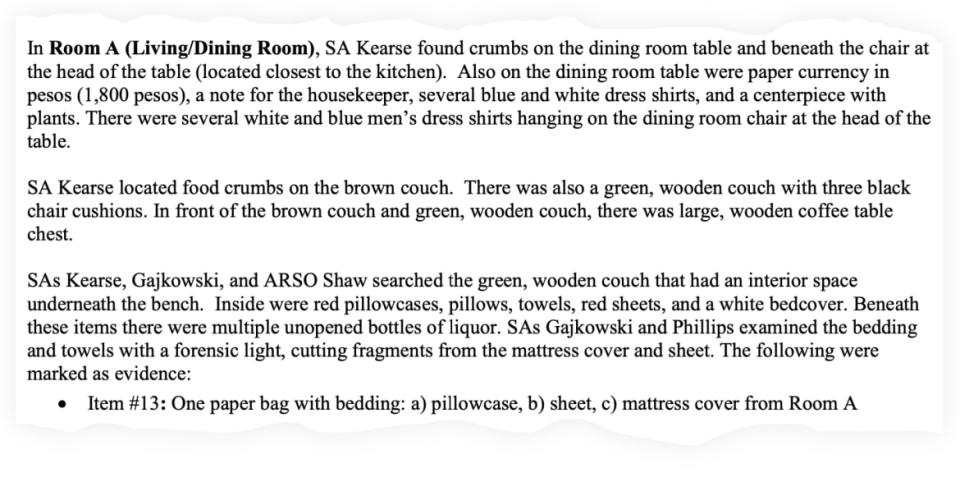CIA Spook Who Admitted Raping Unconscious Women Does a U-Turn: I’m Impotent!

A former CIA officer who pleaded guilty to drugging and sexually assaulting at least 26 women while on assignment abroad is now claiming he couldn’t have done everything he’s accused of because he suffers from erectile dysfunction.
Brian Jeffrey Raymond was arrested Oct. 9, 2020, in La Mesa, California. The “experienced sexual predator,” as prosecutors described him, had been living with his parents in his childhood hometown after abruptly returning to the U.S. from his undercover posting at the U.S. Embassy in Mexico City. A source close to the case told The Daily Beast that the CIA began an internal administrative inquiry after Raymond’s arrest, and that he resigned from the agency shortly thereafter.
The vile allegations against Raymond, 45, stemmed from an incident in late May 2020, when a passerby reported seeing a “naked, hysterical woman desperately screaming for help” on the terrace of a Mexico City apartment leased by the U.S. government. Investigators subsequently discovered some 500 photos and videos of unconscious women in Raymond’s bed. Prosecutors said he could be seen in various shots, holding open the women’s eyes, waving their limp arms and legs around, or putting his fingers in their mouths to show that they are indeed passed out cold.
Raymond pleaded guilty last July to sexual abuse and transporting obscene material, and faced between 13 and 27 years in federal prison at sentencing, which was scheduled for November. He would be required to register as a sex offender for life upon release.But in an Apr. 29 motion seeking to withdraw his guilty plea, Raymond’s lawyers floated a novel argument—among others—as to why the veteran spook now wants to back out of the deal.

The sudden about-face revolves in part around one of Raymond’s more than two dozen victims, a Mexican national who worked at a call center. She told investigators she became violently ill and blacked out at Raymond’s apartment after drinking some wine and liquor he had poured for her. The woman, identified in court records as Adult Victim 7 or “AV-7,” and Complainant #7, said she woke up the next morning, naked in Raymond’s bed, without any memory of having taken her clothes off.
She and Raymond then had consensual sex, the woman told investigators, explaining that she again began to feel nauseated in the middle of it and went to the bathroom to compose herself. There, she saw a used condom on the vanity, from the night before—but didn’t remember having sex with Raymond.
Later, agents discovered 77 photos and four videos on Raymond’s phone of the woman, unconscious, with Raymond opening her eyelid and pulling down her lower lip, putting his fingers in her mouth, and closeups of her breasts and genitals, court filings state.
When agents showed AV-7 the images of herself said she “was unaware of any photographs and videos from that evening, never had any conversations with Raymond about photographs or videos, did not consent to them being taken, and did not consent to Raymond touching her body while she was unconscious,” FBI Special Agent Erin L. Sheridan said in a search warrant affidavit filed Dec. 31, 2020.

Among the material found on two phones seized by investigators were messages with one of victim about alcohol (right) and a profile of a woman he met on a dating site (left).
But after admitting to it all in July 2021, Raymond said on Friday it couldn’t have happened the way prosecutors say it did.
According to the motion, Raymond has an enlarged prostate for which he has been taking dutasteride, a drug marketed under the brand name Avodart, “for years.” One of the side effects of dutasteride, the filing points out, is erectile dysfunction. To combat this, the filing says Raymond used Cialis, a prescription medication in the same family as Viagra and Levitra.
“As a person with ED, Mr. Raymond experiences a prolonged refractory period (the time between ejaculation and when he can again achieve an erection), generally at least 12 hours,” the motion says. “Therefore, he asserts that he could not have had sex with Complainant #7 to the point of ejaculation during the night (as allegedly evidenced by a used condom in the bathroom), and then also had consensual sex with Complainant #7 in the morning, which he clearly did, because both he and she remember that occurring.”
Investigators only found one used condom in the apartment during a subsequent search, Raymond’s lawyers say. Raymond is also arguing that his first set of defense lawyers gave him bad advice, and that the way investigators gained access to crucial evidence on his phone—in fact, the basis for just about all the government’s evidence in the case—violated his constitutional rights.

Among the evidence laid out by prosecutors in an April court filing was “what appears to be [a] list of women with whom [Raymond] had sex in an email he sent to himself labeled ‘Mortgage and Interest Expenses.’ The email seems to contain only a partial list, beginning with #61 in 2016 and ending with #143 in 2020, with the last entry occurring shortly before his arrest. The list contains the names and nationalities of the women, whether they had fake breasts, and a month/year.”
AV-7 was on that list, according to prosecutors. Yet, until the criminal allegations surfaced, she thought Raymond was “attractive, incredible,” and said she “liked him,” the woman told investigators, according to an interview memo included in a separate court filing. She said she felt secure knowing he worked for the U.S. government and lived in a government apartment.
After AV-7 got sick and vomited in Raymond’s sink, he “showed care and concern for her, bringing her water and telling her it was okay that she threw up,” the filing says. “Because the defendant was being so kind to her, she assumed he had done nothing wrong. She blamed herself for possibly ruining her chances at a relationship with him.”
Once investigators told AV-7 about the accusations against Raymond, and showed her the photos and videos he had taken of her, she “expressed that [Raymond] destroyed her life,” the filing continues. “She feels like ‘garbage’ and does not feel safe. She has trouble sleeping and experiences nightmares. She was so distracted after learning what [Raymond] had done to her that she was fired from her job.”
Accused Embassy Serial Rapist Lured Woman From U.S. to Mexico, Feds Say
In June 2020, shortly after Raymond returned to the U.S., he was interviewed by a pair of federal agents in a government vehicle parked outside a Jimmy John’s sub shop in Herndon, Virginia. The conversation is included in hundreds of pages of exhibits filed in court last week.
“I’m a single guy,” Raymond told the agents, who had asked him about AV-7. “I date girls. This has never happened to me before, and I’m a very chill individual. I’m not aggressive… We did have things to drink that night, but I never got the impression that she was not of sound mind or anything like that.”
Raymond also told the agents he did not take prescription medication of any kind, contradicting his filing on Friday claiming he takes two drugs to combat his enlarged prostate and the associated ED.
“For many of the victims, their complete lack of memory continues to cause them great distress—they will never know exactly what the defendant did to them,” prosecutors said in an April 14 court filing. “They are struggling to cope. Some of them have lost their jobs. Many of them experience nightmares, sometimes featuring either the defendant or their own lifeless bodies. Many continue to struggle with anxiety. Some have lost relationships, as they have been rendered unable to trust or experience intimacy with another person. The defendant’s actions have significantly impacted their lives.”
Raymond remains in custody at a Washington, D.C. jail. The government has until May 20 to file a response to Raymond’s motion to change his plea. His lawyers, Anthony Joseph Jay III and John Marston, declined to comment to The Daily Beast.
Get the Daily Beast's biggest scoops and scandals delivered right to your inbox. Sign up now.
Stay informed and gain unlimited access to the Daily Beast's unmatched reporting. Subscribe now.

